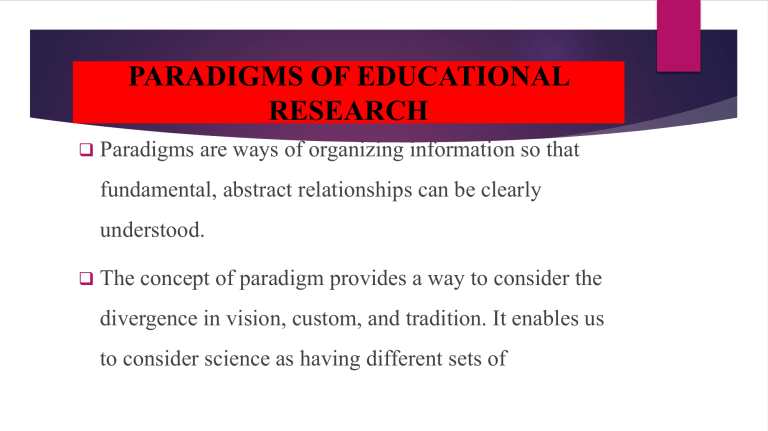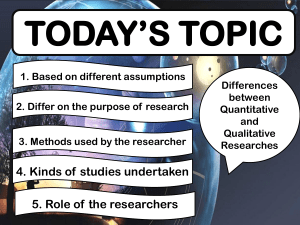
PARADIGMS OF EDUCATIONAL RESEARCH Paradigms are ways of organizing information so that fundamental, abstract relationships can be clearly understood. The concept of paradigm provides a way to consider the divergence in vision, custom, and tradition. It enables us to consider science as having different sets of CONTINUATION assumptions, commitments, procedures and theories of social affairs. Quantitative and qualitative approaches in Educational Research Quantitative research is the process of collecting and analyzing numerical data. Quantitative research is a research strategy that focuses on quantifying the collection and analysis of data. CONTINUATION It can be used to find patterns and averages, make predictions, test causal relationships, and generalize results to wider populations. CHARACTERISTICS Contain Measurable Variables. Use Standardized Research Instruments. Assume a Normal Population Distribution. CONTINUATION Present Data in Tables, Graphs, or Figures. Use Repeatable Method. Can Predict Outcomes. Use Measuring Devices QUALITATIVE APPROACH Qualitative approach involves collecting and analyzing non-numerical data. e.g., text, video, or audio) to understand concepts, opinions, or experiences. It can be used to gather in-depth insights into a problem or generate new ideas for research. CHARACTERISTICS Natural environment (natural setting). Researcher as a key instrument (researcher as key instrument). Multiple sources of data. Inductive data analysis. CONTINUATION The meaning of the participants (participant’s meaning) Design that develops (emergent design) Theoretical perspective (theoretical lens). Interpretive. A holistic account. MIXED APPROACH Mixed research- research that involves the mixing of quantitative and qualitative methods or paradigm characteristics. Nature of data is mixture of variables, words and images.


